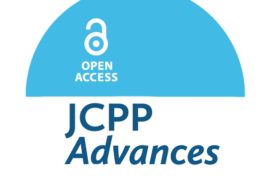In this Papers Podcast, Dr. Fiona Challacombe discusses her JCPP paper ‘Paternal perinatal stress is associated with children’s emotional problems at 2 years’ (https://doi.org/10.1111/jcpp.13695). Fiona is the first author of the paper.
There is an overview of the paper, methodology, key findings, and implications for practice.
Discussion points include:
- Why fathers have been largely left out of the picture in terms of parental mental health in pregnancy and post-partum, and why it is important to include them.
- How the engagement of fathers in clinical services could be improved.
- The impact of father’s mental health on infant and child development.
- Does paternal emotional stress exert a different influence on infants and children in comparison to maternal emotional distress?
- Implications of their findings for health care providers and child and adolescent mental health professionals.
- The existing intervention strategies and targeted interventions that are found to work for paternal perinatal stress, and what more could be done.
In this series, we speak to authors of papers published in one of ACAMH’s three journals. These are The Journal of Child Psychology and Psychiatry (JCPP); The Child and Adolescent Mental Health (CAMH) journal; and JCPP Advances.
Subscribe to ACAMH mental health podcasts on your preferred streaming platform. Just search for ACAMH on; SoundCloud, Spotify, CastBox, Deezer, Google Podcasts, Podcastaddict, JioSaavn, Listen notes, Radio Public, and Radio.com (not available in the EU). Plus we are on Apple Podcasts visit the link or click on the icon, or scan the QR code.

Fiona is a clinical psychologist and researcher in the field of perinatal mental health. She is currently a clinical lecturer in Perinatal Psychology at King’s College London and has developed and led a specialist NHS clinical service for parents with anxiety disorders from pregnancy to the end of the third postnatal year. She is patron of the service user led charity Maternal OCD which raises awareness of the disorder amongst service users and healthcare professionals. Fiona’s research interests include adaptation of treatments in the perinatal context, and how to support parental mental health in the context of high-risk pregnancies and complex outcomes. She is also particularly interested in equity of access and outcomes in perinatal mental health. She is author of Break Free from Maternal Anxiety, and self-help and practitioner books on OCD. She regularly provides training and clinical supervision on perinatal mental health.
Other resources
- Featured paper ‘Paternal perinatal stress is associated with children’s emotional problems at 2 years’, (2022). Fiona L. Challacombe, Johanna T. Pietikäinen, Olli Kiviruusu, Outi Saarenpää-Heikkilä, Tiina Paunio, E. Juulia Paavonen
Transcript
[00:00:07.530] Jo Carlowe: Hello, welcome to the Papers Podcast series for the Association for Child and Adolescent Mental Health, or ACAMH for short. I’m Jo Carlowe, a Freelance Journalist with a Specialism in Psychology.
Today, I’m interviewing Clinical Psychologist and Researcher, Dr. Fiona Challacombe, Clinical Lecturer at the section of Women’s Mental Health at the Institute of Psychiatry, Psychology and Neuroscience, King’s College London. Fiona is also the first author of the paper, “Paternal Perinatal Stress is Associated with Children’s Emotional Problems at Two Years,” recently published in the Journal of Child Psychology and Psychiatry, which is one of ACAMH’s three journals. ACAMH also produces the Child and Adolescent Mental Health, known as CAMH, and JCPP Advances.
The focus of today’s podcast will be on “Paternal Perinatal Stress and its Impact on Infants and Children.” If you’re a fan of our In Conversation series, please subscribe on your preferred streaming platform, let us know how we did, with a rating or review, and do share with friends and colleagues.
Fiona, thank you for joining me. Can you start with an introduction about who you are and what you do?
[00:01:15.510] Dr. Fiona Challacombe: I am a Clinical Psychologist and a Clinical Lecturer at King’s College. So, I’m a practitioner in the area of parental mental health, and I work with parents, any gender with – generally with anxiety problems from pregnancy up until toddlerhood, really, up until the end of the third year. And my research also focuses in that area on parental mental health and particularly, in perinatal mental health around which is pregnancy, and the years following birth.
[00:01:42.900] Jo Carlowe: Great, thank you. We’re going to focus on fathers in this podcast, yet when it comes to parental mental health in pregnancy and postpartum, the emphasis is usually on mothers. And I believe that holds true even amongst the research community. Why, in your view, have fathers been largely left out of the picture, and why is it so important to include them?
[00:02:06.150] Dr. Fiona Challacombe: So, I think interest in perinatal mental health has been increasing. It’s been a real, sort of, step change, I think, over the last, kind of, 30 years. And understandably, I think the focus has been on mothers and traditionally, the birthing parent and the primary caregiver. But I think the – our understanding of parental mental health has really been increasingly put in context in the family system and really thinking about all of the influences on child development being very important, and some really big influential studies that have collected data on father have really started to help our understanding of the impacts of paternal mental health and in its own right.
So, and I think with that really, and perhaps alongside the changing roles of fathers is much more, kind of, prominent and more involved and equal in parenting. I think there’s rightfully been more attention to fathers’ mental health and support with that as well, and understanding of course that they experience difficulties too. So, all of these things, I think, have contributed to increasing interest and importance of paternal mental health.
[00:03:16.060] Jo Carlowe: I’m wondering about the engagement of fathers and how that might be improved.
[00:03:19.610] Dr. Fiona Challacombe: It’s a really important question, and I think if we’re talking about engagement in clinical services, there’ve been some really important changes over the last year. So, in perinatal services now, and the ambition was to include fathers as participants and having treatment under those services. So, those are, kind of, important changes, but I think it’s always been more difficult to engage fathers. You know, maternity services tend to be woman centric and I think we’re still developing, I think, the best ways to help fathers feel properly included, and engaged in those services.
And I think, kind of, research goes hand-in-hand really, kind of, emphasising the importance of fathers in their own right, but offering services that fathers want to access as well alongside that and they feel able to access. So, there’s lots of thought, kind of, going into the best ways to do that. But that’s one of the, kind of, backgrounds of our research really, that fathers are perhaps less likely to think about their own difficulties in terms of mood problems and so on.
So, there’s some evidence before our study really looking at, kind of, framing things in terms of stress actually, is more acceptable to fathers or more in line with the experiences they’re having. It’s still, I think, more tricky to get fathers into research and we have to perhaps think about other ways of recruitment and I think the use of fathers in improving that too.
[00:04:51.100] Jo Carlowe: Well, let’s look at the research that you’ve mentioned. So, you recently published the JCPP paper, “Paternal Perinatal Stress is Associated with Children’s Emotional Problems at Two Years.” This paper encapsulates the themes of today’s podcast. Can you give us an overview of the paper? What did you look at and how did you go about this?
[00:05:09.810] Dr. Fiona Challacombe: This paper used data from a study that was going on in Finland that was originally designed to, sort of, look at sleep and impacts on child development, in the context of parental mental health. But has a very nice cohort of nearly – of just over 900 mothers and fathers and tracking them from pregnancy up until – I think it’s still going on, really – up until well beyond – into childhood, beyond the perinatal period.
Due to this really nice, sort of, take-up rate, they’re able to, kind of, follow parents up and children into that period. We were able then to look at the influence of, kind of, both maternal and paternal factors. They were all – ‘cause, sort of, mothers and fathers would just stay in this study.
We used these questionnaire measures, so – as a big sample. So, we had, kind of, brief versions of some of the measures to really examine the different, kind of, influences on child development at different times. So, in the analysis, we were able to look at different timepoints. We had questionnaires from pregnancy, three months, postnatal, eight months, and looking at child outcomes at two years, and able to put all those timepoints together and look at whether actually, father’s mental health, and we measured anxiety, stress, and depression, in both mothers and fathers, and look at the relative contributions of those factors to child outcomes and behaviour and emotional difficulties at two years.
So, in the study, we found that actually, maternal mental health made a big contribution as did paternal mental health, but fathers stress, particularly at three months, made the strongest, kind of, contribution to down the line child outcomes.
[00:06:55.350] Jo Carlowe: So, drawing on that research and, I guess, also your clinical experience, what impact does a father’s mental health have on infant and child development?
[00:07:05.990] Dr. Fiona Challacombe: It’s considerable, and I think it’s really important to emphasise, in both directions, so, that actually, it’s a real protective factor where fathers are involved and attuned. I think that’s just an important, kind of, framing and at the same time, where fathers might be experiencing difficulties, that does have an impact.
What’s interesting here and what we intend to, kind of, pick apart in future papers is the mechanisms of influence. So, fathers are increasingly spending time with children and being engaged, but if fathers are experiencing stress or depression, that the quality of those interactions, exactly as with mothers, might be compromised and impaired.
Paternal mental health as a, kind of, correlation with maternal mental health. We know that, kind of, the parental relationship and particularly conflict can have an influence on child development as well. So that, sort of, triangulation of factors perhaps in terms of, sort of, paternal mental health, there’s been some really important work looking at, kind of, there are perhaps gender differences in terms of, kind of, the roles of mothers and fathers, and fathers being more exploratory with children, taking the more, kind of, risk-taking and that being, kind of, balanced with more perhaps nurturing behaviour from mothers.
But if that’s difficult for a father, perhaps, kind of, not being able to engage with life outside the home and so on, that that again, could be another reason that children could be impacted. So, there’s lots of, sort of, possible things to unpick, beyond these results, into how and why.
[00:08:42.349] Jo Carlowe: Again, this might be tricky to unpick, but in terms of the impact on the infant, does paternal emotional distress exert a different influence to maternal emotional distress?
[00:08:54.190] Dr. Fiona Challacombe: Some aspects might be similar and some aspects might be different and, sort of, indirect. So, it’s quite a complicated picture. So, it might be similar in terms of, kind of, you know, the impact of withdrawn behaviour of a father, and particularly if that’s going on in the mother as well. There are these, kind of, interactive reciprocal relationships. So, the mechanisms could work in the same way, but might have different levels of influence. Perhaps if the mother is the primary caregiver and the father is not there, it could work in the same way, but there’s less exposure perhaps.
We found more of an impact of paternal stress in fathers than in mothers. So, perhaps it – there’s something about the manifestation of difficulties that in that particular way that might leave fathers perhaps being outside the home more, it might have an impact in that way. I mean, there’s discussion, I guess, about, kind of, with mental health measures perhaps not capturing some aspects of male experience being perhaps more likely to, kind of, use substances or feel more irritable as opposed to sad and so on. So, there might be, kind of, differentials there in terms of, kind of, how these experiences manifest on an everyday level.
[00:10:09.890] Jo Carlowe: So, can I just check something that – would that be those type of things you’ve illustrated be a manifestation of stress? As, again, I’m trying to differentiate paternal stress as against, say, paternal depression or anxiety.
[00:10:24.020] Dr. Fiona Challacombe: Yeah, exactly. So it’s an important question as to what these measures capture. There is of course some overlap, but if the measures of depression that we have capture something more about emotional sadness, measures of stress seem to capture more about these other types of behaviours. Not really, you know, feeling overwhelmed and not being able to, sort of, cope and perhaps ways of dealing with it might be different, whether this is an interesting debate as to whether it’s the same concept, but manifest in a different way. But in terms of what we measured, our measure of stress was essentially stronger by capturing that.
[00:11:01.389] Jo Carlowe: In your JCPP paper, you state that “paternal stress exerts a greater influence on child internalizing than externalizing symptoms.” Can you elaborate on this?
[00:11:14.620] Dr. Fiona Challacombe: Yeah, so that’s what we found in the data. So, externalising symptoms might be more things like, sort of, having tantrums, whereas internalising symptoms would be, kind of, anxiety or distress in the child, shown in a different way. So, that was our, kind of, result. And again, perhaps it comes down to mechanisms and speculating what might be going on in terms of the mechanism of impact, really. So, is it something that is having more of an impact via the mother or the, sort of, family atmosphere that might have a particular impact on anxiety, let’s say, or those internalising symptoms.
[00:11:51.511] Jo Carlowe: Fiona, what are the implications of your findings for healthcare providers and CAMH professionals?
[00:11:57.200] Dr. Fiona Challacombe: So, I think this is one, in a line of studies, again illustrating that paternal mental health really is important. Not just in its own right, but on child development. So, we must continue to bring fathers into the discussion to consider them as parents and help them, where needed, really.
I think the second thing is going back to this idea of stress, perhaps that’s a more accessible way or perhaps that’s a better measure to give to fathers to start that conversation really and recognise their needs. So, it might not be picked up or it might be less acceptable to be using other measures, such as depression and anxiety.
But I think, you know, the third thing is the timing, really. So, again, our results show that this three-month period seem to really stand out, and I think parents can relate to the fact that’s a particularly, difficult time of, kind of, following birth, you know, sleep deprivation and so on. So, it might be a time that stress is particularly high. It might be also a critical time in child development as well. So, that might be a good time to really focus, kind of, inquiries and support actually.
[00:13:10.149] Jo Carlowe: In terms of support, and this is in relation to paternal perinatal stress, what existing prevention strategies or targeted interventions are found to work, and what else would you like to see developed?
[00:13:24.399] Dr. Fiona Challacombe: I think we always need more on the intervention side. There are some fantastic initiatives such as, kind of, apps for dads and helping, you know, dads be involved in their child’s development through pregnancy and so on. And, sort of, some really innovative ways to, kind of, engage dads who tend to be spending perhaps more time outside the home. And with our policies in the UK, a very limited, kind of, paternity leave, and I think these things will have an impact really.
And we know from other studies that approaching dads perhaps mental health through fatherhood is a good way to go rather than through a, sort of, mental health route. Connecting fathers with other fathers is another approach, which has worked and actually, workshops around stress and parenting stress rather than mental health seem to be more acceptable. So, I guess, you know, supporting what we’ve found in the study as well.
So, all of these things I think are really promising, but probably not as well known or available or as accessible as they might be. And another, you know, huge aspect I think for fathers and for policy makers too is that investing resources at this point is absolutely crucial and really could save money later. Our study supports that idea, in various points in the literature, that if we really help parents through a difficult period of transition, we will save a lot of distress. We will potentially prevent problems and of course save money later with our treatment services.
[00:14:58.790] Jo Carlowe: So, it’s a key message to policymakers?
[00:15:00.740] Dr. Fiona Challacombe: Yeah.
[00:15:01.740] Jo Carlowe: Is there anything else that feels important to highlight on the topic of paternal perinatal mental health?
[00:15:07.800] Dr. Fiona Challacombe: Yeah, in this study and this type of study, we were able to, kind of, look at stress and, kind of, depression anxiety. I think there are many, kind of, manifestations of particular issues that need to be thought about with fathers. So, research, I think, is catching up with, say, the – you know, the impact of, say, perinatal loss and bereavement, perhaps specific difficulties such as OCD and other anxiety problems.
So, I think, thinking of fathers as fathers and I think in our routine services, making sure that when we have a new parent, we tend to – if it’s a dad, not, kind of, flag up that they are fathers at this particular time as well. So, I think – so, looking for particular issues, say, beyond the broad-brush anxiety and depression and stress too.
[00:15:58.270] Jo Carlowe: Great, and finally, Fiona, what is your take home message for our listeners?
[00:16:02.870] Dr. Fiona Challacombe: The take home message is to consider all aspects of the family. Thinking about each parent in their own right and as a family system and continuing the good work I think of offering interventions, both family-based, but also, for individual parents where appropriate.
[00:16:20.240] Jo Carlowe: Fiona, thank you so much. For more details on Dr. Fiona Challacombe, please visit the ACAMH website, www.acamh.org, and Twitter @acamh. ACAMH is spelt A-C-A-M-H, and don’t forget to follow us on your preferred streaming platform, let us know if you enjoyed the podcast, with a rating or review, and do share with friends and colleagues.





Discussion
Thanks, this was interesting. I resonates with my personal experience and that of close friends. It also ties into some discussions we are having as a school about engaging fathers in our Early Help support and parenting workshops. We are planning on tackling sessions for parents as group support (we are all parents-let’s support each other) rather than parenting courses. I like the idea of Parenting stress support for dads.